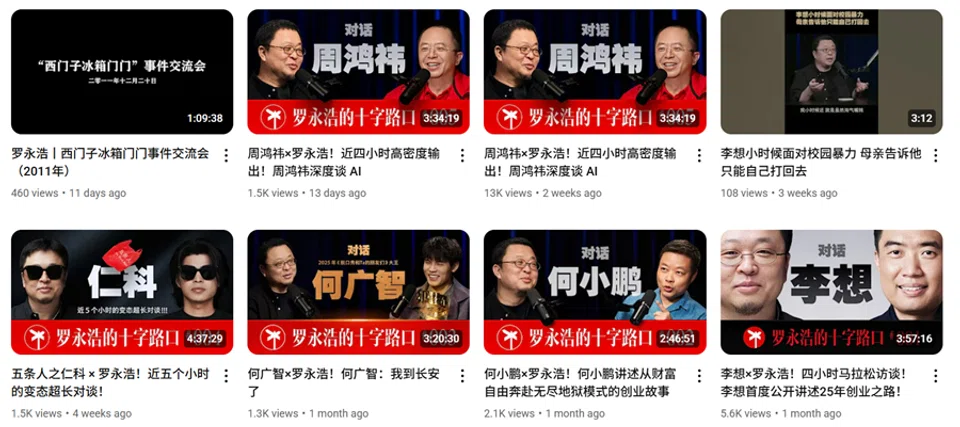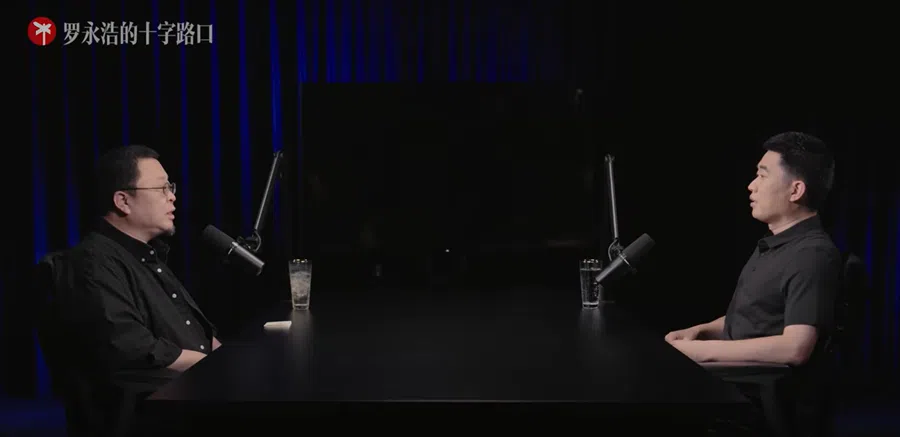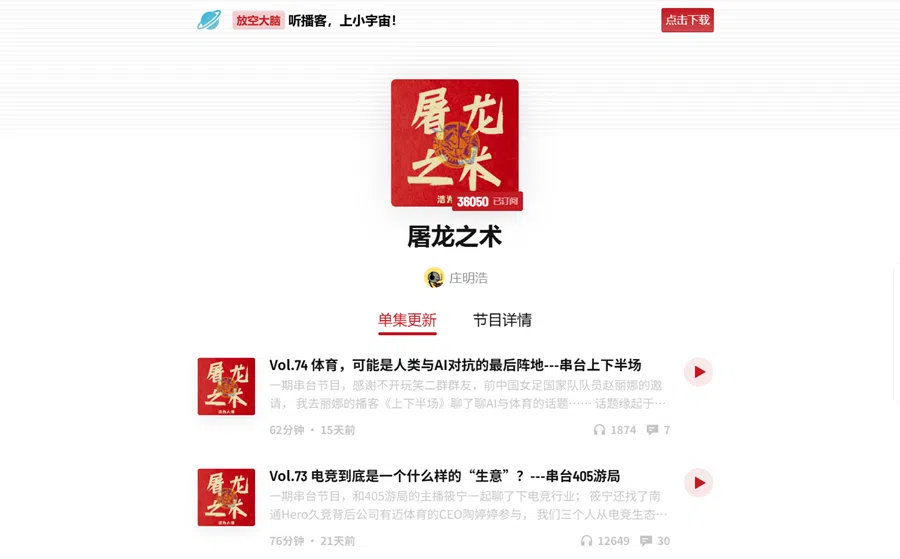How Trump sparked China’s new vodcast fever
After years of short video domination, Chinese platforms like Douyin and Bilibili are betting on vodcasts as the next frontier — transforming the “ear economy” into a visual revolution inspired, in part, by Trump. Lianhe Zaobao journalist Zhang Guanghui takes a look at the phenomenal growth of this new form of content in China.

Chinese tech internet celebrity Luo Yonghao, known for his string of failed startups, revealed that earlier this year, Liang Wenfeng — founder of leading AI firm DeepSeek — told him: “Out of 1.4 billion people in China, you’re among the best at making a living with your mouth. That’s a talent you should never waste.”
Taking that advice to heart, Luo launched a vodcast programme titled “Luo Yonghao’s Crossroads” (罗永浩的十字路口) in August — and it’s hardly surprising that it became an instant online hit. In a recent episode aired on 24 September, Luo recounted the conversation and admitted that the show was, in part, inspired by Liang.
The rise of vodcasts?
The show, a tech entrepreneurship interview series reminiscent of The Joe Rogan Experience, is seen as Luo’s latest business venture. He noted that the debut episode in August — a four-hour conversation with Li Xiang, founder of Li Auto — amassed over 20 million views in just one day. Sponsorship deals for the show are now “in full swing”.
Around the same time, other well-known Chinese personalities who also “make a living with their mouths” — including crosstalk performer Yu Qian, television host Chen Luyu and comedian Li Dan — also jumped on the vodcast bandwagon with in-depth interviews.
The latest surge in vodcast popularity is driven by major Chinese internet platforms such as Bilibili, RedNote and Douyin, all of which boast daily user bases exceeding 100 million.

Previously, podcasts — a medium reliant solely on sound — remained a niche interest in China. Although several industry reports claim that China has over 100 million podcast users, leading podcast app Xiaoyuzhou once disclosed that its daily active users were only in the low millions, far behind the over 100 million daily users seen on mainstream video platforms. Thus, the podcast industry has long struggled with commercialisation challenges, often mocked as being “in its breakout year” every year.
The latest surge in vodcast popularity is driven by major Chinese internet platforms such as Bilibili, RedNote and Douyin, all of which boast daily user bases exceeding 100 million. These platforms are now betting on vodcasts as a new growth engine, aiming to transform the “ear economy” into a more viral “visual economy”.
Enticed by Trump’s vodcast appearance
Yuan Baolong, founder of podcast production agency Chinese Podcast Community (播客公社), told Lianhe Zaobao that mainstream platforms turned their attention to vodcasts after Donald Trump appeared on The Joe Rogan Experience last October, when the former was still the Republican presidential nominee. “Bilibili started preparing for this around December,” he noted.
The year 2024 is now seen as the beginning of the “podcast election era”. During the previous US presidential race, Trump took part in dozens of podcast recordings, with his podcast with comedian Joe Rogan drawing particular attention. The three-hour episode garnered over 60 million views on YouTube and sparked debate on Chinese social media over how podcasts were aiding Trump’s campaign. From then on, vodcasts gained traction.
Based on data revealed by several Chinese media outlets, Bilibili asserted that, even without direct involvement from its product operations team, the platform attracted over 40 million vodcast viewers in the first quarter of this year. Total watch time surged to 25.9 billion minutes, a year-on-year increase of more than 270%.
JustPod noted that transitioning from pure audio to video tripled the workload, with “every small step in execution being potentially ten times more complex than that in a standard audio podcast recording”.

Meanwhile, YouTube announced in February that its podcast service had surpassed 1 billion monthly active users. An increasing number of creators are now uploading video content to complement traditional audio formats, making the world’s largest video platform the most frequently used outlet for podcasts in the US.
Amid this convergence across East and West, Bilibili — long dubbed the “Chinese YouTube” — became the first to roll out a series of vodcast support initiatives in July, partnering with several Chinese celebrities to launch exclusive shows. RedNote followed in August, introducing creator campaigns to encourage users to publish vodcasts on its platform.
ByteDance is similarly testing the water. Its subsidiary Douyin launched a medium-to-long-form video app last year in a bid to promote higher-quality content — and to counter the platform’s negative reputation captured by a popular saying: “When Douyin chimes, parents have raised their children in vain.(抖音一响父母白养)” It also co-produced a vodcast programme with podcast production company JustPod.
High production costs and efforts
In a WeChat post introducing the show, JustPod noted that transitioning from pure audio to video tripled the workload, with “every small step in execution being potentially ten times more complex than that in a standard audio podcast recording”.
Thus, despite major platforms actively promoting vodcasts, the significantly higher production demands compared with audio programmes have deterred many traditional podcast creators from making the leap.
Zhuang Minghao, host of the tech podcast “Tulong Zhi Shu” (屠龙之术, lit. Dragon-Slaying Technique), said in an interview that China’s podcast industry emerged on the margins of a media environment where “short videos are king”. Some fundamentalist podcast creators may neither care for the traffic offered by major platforms nor have the capacity to produce video content — especially given that video still carries significantly higher production costs than audio.

While he acknowledged that video formats could help Chinese podcasts “break out of their niche” and explore new business models, “it remains uncertain whether this will resolve the industry’s structural issues”.
Meanwhile, Yuan Baolong thinks that if mainstream platforms adopt vodcasts as a strategic priority, this “battle” could be sustained and “all the challenges that came with podcasts being audio-only will inevitably be overcome”.
Short videos still king?
As for why vodcasts are emerging now, Zhuang, who is also a former vice president at venture capital firm Matrix Partners China, believes that given the current competitive landscape of content platforms in China, it is challenging to find a new category with both growth potential and strong marginal utility — and “vodcasts appear to fit the bill”.
In August, Bilibili CEO Chen Rui said during the Q2 earnings call that the company still has vast expansion potential in emerging areas like podcasts.
“Why have microdramas seen such overwhelming success overseas? It’s because they were developed in a country where drugs and eroticism are strictly banned, so their impact is formidable.” - Zhuang Minghao, host of the tech podcast “Tulong Zhi Shu”

Zhuang remarked that after a decade of the “short video is king” era, the battlefield has reached its limit — “users have been so thoroughly conditioned that there’s no room left to retrain them.” As a result, he said, “microdramas and ‘group livestreams’ have emerged — the razor-sharp sickles of an industry honed to its very edge.”
He explained, “Why have microdramas seen such overwhelming success overseas? It’s because they were developed in a country where drugs and eroticism are strictly banned, so their impact is formidable.”
But he also cautioned that such extremes are bound to backfire. “People need something that’s not so short, less densely packed — something that can calm their emotions,” he said. “And that need may extend beyond vodcasts.”
This article was first published in Lianhe Zaobao as “中国主流平台押注视频播客成业务新增长点”.



![[Big read] When the Arctic opens, what happens to Singapore?](https://cassette.sphdigital.com.sg/image/thinkchina/da65edebca34645c711c55e83e9877109b3c53847ebb1305573974651df1d13a)

![[Video] George Yeo: America’s deep pain — and why China won’t colonise](https://cassette.sphdigital.com.sg/image/thinkchina/15083e45d96c12390bdea6af2daf19fd9fcd875aa44a0f92796f34e3dad561cc)